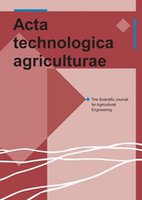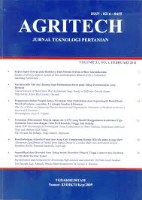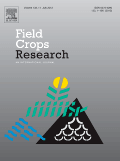
Acta Technologica Agriculturae
Scope & Guideline
Advancing Sustainable Solutions for a Greener Future
Introduction
Aims and Scopes
- Agricultural Engineering and Technology:
The journal covers a wide range of topics related to agricultural engineering, including the design, optimization, and analysis of machinery and systems used in agriculture. - Sustainable Agricultural Practices:
Research on sustainable methods and technologies aimed at improving productivity while minimizing environmental impact is a core focus, including studies on biofuels, waste management, and resource conservation. - Precision Agriculture:
There is a significant emphasis on precision agriculture technologies, including the use of sensors, data analytics, and automation to enhance agricultural efficiency and crop management. - Soil and Crop Management:
The journal includes research on soil properties, nutrient management, and the impact of tillage and cropping systems on soil health and productivity. - Renewable Energy in Agriculture:
The integration of renewable energy solutions, such as biogas production and solar energy applications in agricultural settings, is a prominent area of exploration.
Trending and Emerging
- Smart Farming Technologies:
The rise of IoT, AI, and robotics in agriculture is becoming increasingly relevant, with papers focusing on autonomous systems and precision agriculture solutions. - Waste Management and Bioenergy Production:
Research on converting agricultural waste into energy, particularly through anaerobic digestion and biogas production, is gaining momentum as sustainability becomes a priority. - Climate-Resilient Agricultural Practices:
Emerging studies on adapting agricultural practices to climate change impacts showcase an increasing focus on resilience and sustainability in crop production. - Use of Advanced Materials in Agriculture:
Innovations in materials, such as nanotechnology and biodegradable materials for agricultural applications, are trending as researchers seek to enhance efficiency and reduce environmental impact. - Data-Driven Agriculture:
The integration of big data analytics and machine learning in agriculture is becoming a significant area of interest, with studies focusing on optimizing agricultural practices through data insights.
Declining or Waning
- Traditional Tillage Practices:
Research related to conventional tillage methods has decreased as newer sustainable practices gain traction, indicating a shift towards conservation tillage and no-till techniques. - Heavy Machinery Impact Studies:
The focus on the impacts of heavy machinery on soil compaction and land degradation has diminished, likely due to a growing interest in lighter, more efficient agricultural implements. - Basic Agricultural Mechanization:
There has been a noticeable decline in studies centered around basic mechanization principles, as the field moves towards more advanced, automated, and precision technologies. - General Crop Production Techniques:
Research focusing solely on traditional crop production techniques without the integration of technology or sustainability considerations has become less prominent. - Fossil Fuel Dependency in Agriculture:
As biofuels and renewable energy gain attention, research on fossil fuel dependency in agricultural operations is less frequently addressed.
Similar Journals

PRECISION AGRICULTURE
Empowering agriculture with innovative research.PRECISION AGRICULTURE is a leading journal in the field of Agricultural and Biological Sciences, published by SPRINGER. With its ISSN 1385-2256 and E-ISSN 1573-1618, the journal has earned a prestigious reputation, holding a Q1 ranking in its category for 2023, placing it in the top 4% nationally and ranking 8th out of 221 in Scopus. Since its inception in 1999, it has provided a vital platform for researchers and practitioners alike, focusing on innovations in the realm of precision farming practices and technologies designed to enhance agricultural productivity and sustainability. Although not an open-access journal, it provides an exceptional resource through high-quality, peer-reviewed articles that cover diverse topics within precision agriculture. The editorial objectives emphasize the dissemination of cutting-edge research, methodologies, and case studies, making it an invaluable asset for anyone involved in modern agricultural research and practices. PRECISION AGRICULTURE remains an essential publication for advancing knowledge and fostering collaboration within the precision agriculture community.

Agricultural & Environmental Letters
Fostering knowledge for resilient ecosystems and agriculture.Agricultural & Environmental Letters, published by WILEY, is an esteemed open-access journal dedicated to advancing knowledge in the fields of agronomy, environmental science, and soil science. Since its inception in 2016, the journal has provided a vital platform for researchers, professionals, and students to contribute to critical discussions on sustainable agricultural practices and environmental management. With an impressive 2023 impact factor placed in the Q2 category across various fields—namely Agronomy and Crop Science, Management, Monitoring, Policy and Law, and Soil Science—this journal occupies a significant position in academic discourse. The journal’s Scopus rankings further attest to its influential role; it ranks in the top half of its categories, reflecting the quality and relevance of the research published within. Agricultural & Environmental Letters welcomes innovative research articles, reviews, and empirical studies focusing on pressing environmental and agricultural issues, ensuring accessibility for a global audience committed to sustainability in agriculture and environmental stewardship.

INMATEH-Agricultural Engineering
Pioneering Research at the Intersection of Food and EngineeringINMATEH-Agricultural Engineering is a prominent journal dedicated to advancing the field of agricultural and engineering sciences. Published by the INST NATL CERCETARE in Romania, this journal serves as a vital platform for researchers, professionals, and students interested in the intersection of food science, industrial and manufacturing engineering, and mechanical engineering. With its ISSN 2068-4215 and E-ISSN 2068-2239, the journal has established a reputation for being a reputable source of innovative research. According to the 2023 Scopus rankings, it is positioned within Q3 for Food Science and Industrial and Manufacturing Engineering, and Q4 for Mechanical Engineering, reflecting its ongoing commitment to high-quality scholarship. The journal's open-access policy facilitates wide dissemination of its content, enabling researchers to share their findings without barriers. Covering a range of topics relevant to agricultural engineering, from technological advancements to sustainable practices, INMATEH aims to foster collaboration and knowledge exchange among the global academic community. Its convergence period from 2012 to 2024 signifies the journal’s growth and adaptability to emerging trends and challenges in the field.

Transactions of the ASABE
Innovating practices for a resilient agricultural future.Transactions of the ASABE is a premier journal published by the American Society of Agricultural and Biological Engineers, specializing in innovative research and practical applications in the fields of agricultural and biological engineering. With an ISSN of 2151-0032 and E-ISSN 2151-0040, this journal has established a vital niche in disseminating high-quality scholarly content that addresses the complex challenges faced in agriculture and biological systems. The journal operates under an open access model, facilitating broad dissemination of research findings to a global audience. This commitment to accessibility is reflected in its coverage of diverse topics, including agriculture, soil science, food science, and environmental engineering. Although the journal's coverage in Scopus was discontinued in 2021, it once ranked among the top in its categories, indicating its significant contribution to advancing knowledge in these essential fields. Researchers, practitioners, and students are encouraged to engage with the Transactions of the ASABE to stay abreast of developments and foster collaboration in promoting sustainable engineering solutions.

Revista Ciencia Agronomica
Advancing agricultural knowledge for a sustainable future.Revista Ciencia Agronomica is a leading open access journal published by the Universidade Federal do Ceará, Departamento de Geociências, dedicated to advancing the field of agricultural sciences. Established in 2008, the journal has emerged as a significant platform for the dissemination of original research and innovative advancements in areas including agronomy, horticulture, and soil science, with a dedicated convergence of years extending to 2025. With an impactful presence in academic circles—ranking in Q3 for Agronomy and Crop Science and Soil Science and Q2 for Horticulture in 2023—this journal provides vital insights for researchers and practitioners alike. Although specific HIndex metrics are currently unavailable, the journal's Scopus rankings attest to its relevance, placing it in the 52nd, 44th, and 43rd percentiles across multiple pertinent categories. Since transitioning to an open access model in 2010, Revista Ciencia Agronomica has committed to maximizing the reach and impact of its published work, thereby ensuring valuable contributions to global agricultural knowledge.

Agritech
Innovating the Future of Farming Through TechnologyAgritech is a prominent open-access journal dedicated to advancing the field of agricultural technology. Published by UNIV GADJAH MADA, FAC AGRICULTURAL TECHNOLOGY, this esteemed journal disseminates innovative research and cutting-edge practices that contribute significantly to sustainable agriculture, precision farming, and environmental stewardship. Launched in 1999, Agritech has established itself as a vital resource for researchers, professionals, and students alike, providing a platform for the exchange of ideas and findings that shape the future of agricultural technology. By embracing an open-access model, the journal ensures that high-quality research is accessible to a global audience, promoting collaboration and knowledge sharing in the agricultural community. With an ISSN of 0216-0455 and an E-ISSN of 2527-3825, Agritech remains committed to enriching agricultural practices and policies through rigorous scientific inquiry and innovation.

AgriEngineering
Exploring the Intersection of Engineering and AgronomyAgriEngineering is a premier Open Access journal, published by MDPI, focusing on innovative research across the disciplines of agronomy, horticulture, food science, and engineering. Established in 2019 and headquartered in Basel, Switzerland, this journal has rapidly gained recognition, evidenced by its robust performance in the Scopus rankings and its positioning in Q1 and Q2 quartiles of key categories, including Horticulture and Agronomy. With a commitment to disseminating high-quality research that advances agricultural engineering practices, AgriEngineering provides a platform for researchers, professionals, and students to explore cutting-edge developments aimed at enhancing food production systems and sustainability. Its Open Access model ensures wide-reaching accessibility to vital research outcomes, empowering global collaboration and innovation in the field. For more information on submission and access, you can visit the AgriEngineering website.

FIELD CROPS RESEARCH
Driving Change in Agronomy with Peer-Reviewed ExcellenceFIELD CROPS RESEARCH is a premier academic journal published by Elsevier, dedicated to advancing knowledge in the fields of Agronomy and Crop Science as well as Soil Science. Now in its 46th year of publication, this esteemed journal has established itself as a leading resource, holding a prestigious Q1 ranking in both the Agronomy and Soil Science categories, with a remarkable blend of rigorous peer-reviewed research and innovative findings. With a Scopus ranking of #27/406 in Agronomy and #20/159 in Soil Science, and a notable 93rd and 87th percentile respectively, FIELD CROPS RESEARCH plays a vital role in informing practices that drive sustainable agriculture and optimize crop production. Although not an open access journal, it remains highly accessible to the global research community and offers critical insights that influence policy and agricultural practices worldwide. Researchers, professionals, and students are encouraged to delve into this journal, as it continues to shape the future of field crop research through impactful studies and comprehensive reviews.

SCIENTIA AGRICOLA
Advancing agricultural knowledge for a sustainable future.SCIENTIA AGRICOLA is a prestigious, peer-reviewed journal published by UNIV SAO PAULO, ESALQ, dedicated to advancing the field of agricultural sciences. With the ISSN 1678-992X and an e-ISSN maintaining the same number, this Open Access journal has been a valuable resource since 1992, fostering wide dissemination of knowledge and research findings in agriculture. Hailing from Piracicaba, Brazil, associated with one of the leading agricultural universities, SCIENTIA AGRICOLA serves as an essential platform for researchers, practitioners, and students aiming to explore innovative agricultural practices, crop production, and sustainable techniques. Although specific metrics such as H-Index and Scopus Ranks were not provided, the journal's longstanding commitment to open access and impactful research underscores its importance in contributing to the global dialogue on agricultural efficiency and sustainability.

Journal of Tekirdag Agriculture Faculty-Tekirdag Ziraat Fakultesi Dergisi
Advancing agricultural innovation and environmental solutions.The Journal of Tekirdag Agriculture Faculty-Tekirdag Ziraat Fakultesi Dergisi, published by UNIV NAMIK KEMAL, represents a significant platform dedicated to the dissemination of research in the fields of agricultural and biological sciences. With an ISSN of 1302-7050 and E-ISSN 2146-5894, this journal aims to advance knowledge and innovation within its scope, which encompasses a diverse array of agricultural topics and environmental pollution. Notably, it has achieved a Q3 category ranking in Agricultural and Biological Sciences and a Q4 category ranking in Pollution for 2023, reflecting its growing influence in the academic community. Operating from Turkey, the journal publishes articles that seek to address contemporary challenges in agriculture and environmental science, thus fostering collaborations among researchers, professionals, and students worldwide. Researchers can benefit from the journal’s focus on applied sciences, providing insights and solutions pertinent to real-world issues. Engage with cutting-edge studies and contribute to this evolving field by exploring the transformative research featured within.